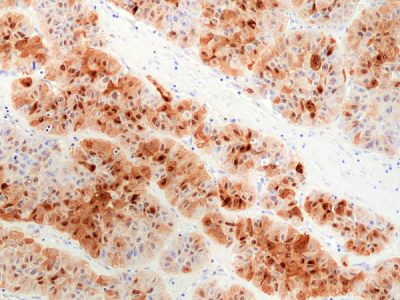
anti-HSP70 (human), Rabbit Monoclonal (RM432)
REV-31-1320-00
ApplicationsWestern Blot, ImmunoHistoChemistry
Product group Antibodies
ReactivityHuman
Overview
- SupplierRevMAb Biosciences
- Product Nameanti-HSP70 (human), Rabbit Monoclonal (RM432)
- Delivery Days Customer10
- ApplicationsWestern Blot, ImmunoHistoChemistry
- CertificationResearch Use Only
- ClonalityMonoclonal
- Clone IDRM432
- HostRabbit
- IsotypeIgG
- Scientific DescriptionHSP70 is a molecular chaperone expressed constitutively under normal conditions to maintain protein homeostasis and is induced upon environmental stress. It functions by acting as molecular chaperones, facilitating protein refolding and preventing protein aggregation. It has been reported that extracellular HSP70 also exhibits immunomodulatory effects on innate and acquired immunity. HSP70 is membrane associated in lysosomes, mitochondria,and the outer surface of cancer cells. It plays a role in vesicle formation and protein trafficking. HSP70 expression in colorectal carcinoma and breast carcinoma has been significantly correlated with low differentiation and poor prognosis, whereas in renal cell carcinoma it has been reported to be associated with good prognosis. Expression of HSPs on the surface of tumor cells, instead of their normal intracellular location, suggests they play a role in inducing an immune response against cancer. - Recombinant Antibody. This antibody RM431 reacts to human HSP70. Application: IHC, WB . Source: Rabbit. Liquid. 50% Glycerol/PBS with 1% BSA and 0.09% sodium azide. HSP70 is a molecular chaperone expressed constitutively under normal conditions to maintain protein homeostasis and is induced upon environmental stress. It functions by acting as molecular chaperones, facilitating protein refolding and preventing protein aggregation. It has been reported that extracellular HSP70 also exhibits immunomodulatory effects on innate and acquired immunity. HSP70 is membrane associated in lysosomes, mitochondria,and the outer surface of cancer cells. It plays a role in vesicle formation and protein trafficking. HSP70 expression in colorectal carcinoma and breast carcinoma has been significantly correlated with low differentiation and poor prognosis, whereas in renal cell carcinoma it has been reported to be associated with good prognosis. Expression of HSPs on the surface of tumor cells, instead of their normal intracellular location, suggests they play a role in inducing an immune response against cancer.
- ReactivityHuman
- Storage Instruction-20°C
- UNSPSC12352203
